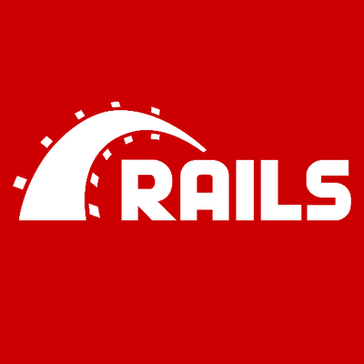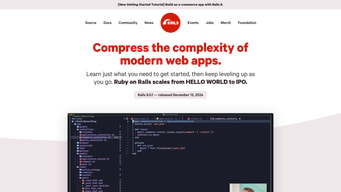

Unclaimed: Are are working at Ruby On Rails ?
Ruby On Rails Reviews & Product Details
Ruby on Rails, often referred to as Rails, is an open-source web application framework written in Ruby. It emphasizes convention over configuration (CoC) and the don't repeat yourself (DRY) principle, aiming to simplify and accelerate web development by providing default structures for a database, a web service, and web pages. Rails enables developers to use a model-view-controller (MVC) pattern to organize application programming. Its rich ecosystem of gems (libraries) allows for rapid development of complex web applications.

| Capabilities |
API
CLI
OSS
|
|---|---|
| Segment |
Small Business
Mid Market
Freelancer
Enterprise
|
| Ease of use |
Intermediate
Advanced
|
| Deployment | Cloud / SaaS / Web-Based, N/A, On-Premise Linux, On-Premise Windows |
| Support | FAQs/Forum |
| Training | Documentation |
| Languages | English |



The community surrounding Rails is vast. This provides a great array of tools that people have built to make developing for Rails much easier. It also means there are people using Rails in a wide range of applications. This feeds back into Rails development, making it a tool that works in many situations. Rails also has a vibrant testing culture. This makes for more reliable products that are well built. It is so easy to do TDD using Rails. This has saved me many hours of hair pulling as every aspect of the products is tested. Overall TDD has improved our release cadence and reduced our code churn significantly.
The Long Term Support is lagging behind what one would expect from a paid product. This is obviously because it is an open source community maintaining the product. However there are paid solutions people can buy into for LTS.
We are working to solve problems relating to Christian Ministry as it interacts with technology. As the most significant advancement since the printing press, computers are simplifying the way we do donor management, outreach, internal communication and much more. With so many cool things we could make to advance the cause of Christianity, we needed a tool which would enable us to do rapid, reliable software engineering. Rails has provided us with the capacity to write fast, write once, write TDD software.
I like the conventions. If you can think correctly then you will find everything there in Rails. It recommends all the best practices for your applications. Another best thing is the community. If you search for anything, in 98% cases you will find it with 1/2 attempts.
I'm biased a lot with Rails, so everything looks good to me.
I have developed wide range of applications, exploiting its gems and as a result rapid development.
Rails favors convention over configuration. This means that, out of the box, it suits a lot of the modern web developer needs. We have used it for both API servicing a single page app, microservices, and traditional Rails app. The defaults are very sane and aimed at giving everyone a good experience.
With such a huge project, it can be hard to get into open source contributions. Rails tries really hard to fix this, but it's still a reality.
We have shipped traditional applications, single page applications, micro-services, etc. We server high expectation SaaS space.
The ease of development and creation of web applications.
Wish there was a more documentation to figure out complex objectives, but that's way of software development.
We solved a problem in our company by developing a web app in rails to manage customers & their jobs(work orders). To create work orders & also log and print the workorders off.
It allows us to quickly build out, test, and iterate on features. This is enabled by convention over configuration, a great open source community with a ton of gems, and easy-to-setup hosting platforms.
Community gems are unreliable and often become outdated and abandoned by the original developers. Ruby is slow and scaling to meet the needs of a growing user-base is expensive.
Call tracking, intelligent routing, and analytics. We were able to build out a product and bring it to market very quickly for minimal cost.
It's ease of use and how fast you can put together a working website.
Convention over configuration is OK, though when something not standard needs to be done is sometimes painful.
From small to medium sites, mostrly for small companies or individuals.
What I like most about this web framework is how fast I can make a page or web application using ruby programming language and simultaneously handle the frontend and backend as a single in the same environment; this makes it agile and magical. Also, over the years, I have made this tool part of my day-to-day functions at work since I do not need more tools to interact with the database or the console of my project; if not, I can achieve this in the same environment. It is a tool that integrates with any operating system but for me it is more comfortable to use it in Linux operating systems such as CentOS or Ubuntu, they are the two distributions that I use and at the moment it is easy to configure and to be able to prepare the environment which makes it even friendlier and the best option when selecting an IDE for projects in Ruby or Rails.
what I don't like sometimes is the handling of javascript and some javascript gems that don't work well, but in new versions this has been improving. Another issue is the cost, perhaps some developers cannot buy it at first, which makes it a tool for companies, there should be a version for independent developers with low resources or who are just starting out
We have made several applications in the company and this framework has helped us a lot to speed up these developments and at the same time to have a quality product and more now with the management of APIs
- Building Web application quickly. - Lots of useful gems - Provide lots of resources for working and researching. - Documents and Tutorials are detail and updated. - Large community with strongly support
They bring "magic" to the framework that it is hard to control when the app becomes bigger.
Building webapp fast enough to show the features, improvements for my projects
Very Easy to learn. Even beginners can design well functional websites with-in a few days using Ruby on Rails. There are very good tutorials for your help. Development is very fast compared to other frameworks. Very supportive and active community. Regular updates on Ruby on Rails Free Third Party Packages (GEMS) Building Minimum viable product is very time efficient. Great testing support
Performance is not that good when the application grows and reaches scales of millions of users. If the app is big, it takes a lot of time doing simple stuff. So it's like a trade-off between performance and ease of use.
I used Ruby on Rails for a couple of projects. One of them was to design a portal for automatic synchronization of data center inventory. I spent less than one week to set up the whole system and able to design a working solution as most of the desired functionalities were available in terms of libraries. Feasibility testing was also very easy and development was very fast.
It has a logical MVC framework that has a LOT of features.
It's so fully featured it can be hard to know if what you are looking for already exists as some one line command. Most of my time was spent figuring out if something was already implemented internally.
We were making a single page internal monitoring application.